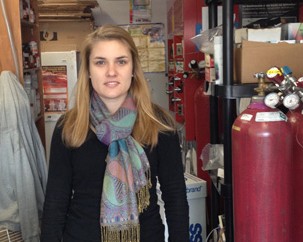'Acfas was the perfect way to feed my intellect'
More than 5,000 academics will converge on campus next spring for the 82nd Congress of l’Association francophone pour le savoir (Acfas). From May 12 to 16, 2014, Concordia is hosting the largest multidisciplinary gathering of knowledge and research in the French-speaking world.
The university’s community is playing a key role in finalizing the program. Faculty and graduate students are also being invited to participate in general session papers and colloquia, and to otherwise showcase their research.
What can they expect from the experience? Anja Moritz — a master’s candidate in the Department of Chemistry and Biochemistry — found out last year at the 81st Acfas Congress, which took place at Université Laval in Quebec City.
What research did you bring to the congress?
Anja Moritz: I presented my master’s research thesis on dissolved hydrocarbon gases and their sources in groundwater in the lowlands of the Saint Lawrence Valley. I was part of a group of researchers from the Laboratoire environnemental de géochimie organique (LEGO) who presented at a colloquium dedicated to the sustainable development of subterranean water.
It was invigorating because the research discussed may eventually be used to evaluate the potential impact of future shale gas exploitation in Quebec. As we all know, this is a hot-button issue — and being a part of this type of discussion with academics from other institutions was an amazing opportunity to expand our knowledge of a complex subject.
What was the experience like?
A.M.: I really appreciated collaborating with so many accomplished researchers in my field. It proved to be a great networking opportunity, and I was able to attend numerous events that deepened my knowledge of organic biochemistry.
What surprised me, though, was how much I enjoyed going to colloquia and poster sessions on subjects outside my field. I’m a curious person by nature, so an event like Acfas was the perfect way to feed my intellect!
Most of the people who participated were very passionate about their work and you could feel a sense of excitement in the air.
Has participating in Acfas helped your academic career?
A.M.: Most conferences I go to are primarily conducted in English. Because this was a French-based conference, it meant that I could present and network with people who may not be at other events because of the language barriers.
There are literally thousands of people from around the world who attend this congress, so the opportunities to connect are endless.
What would you recommend to graduate students who are interested in participating?
A.M.: Be prepared when you present your work, because you will be speaking to top-level academics in the field. This can be intimidating, so knowing your stuff is key.
You should also be prepared to answer questions from people who are not specialists in your field. For example, during my poster sessions I spoke with academics from completely different disciplines who wanted to know more about my research. This meant that I had to explain my work in more straightforward terms to make sure they understood what I was talking about.
How did you feel about presenting in French?
A.M.: French is my mother tongue, so this wasn’t an issue for me, but a fellow researcher from our lab is an anglophone. He was nervous about presenting his research in French because he wasn’t used to vulgarising scientific terms in a language other than English.
The French speakers in our group took the time to review his presentation before the event, and we also helped him rehearse beforehand. And although he was a little anxious, he went in prepared and did an excellent job. I think he was pretty proud of himself because he was able to present his research to a completely new audience.
